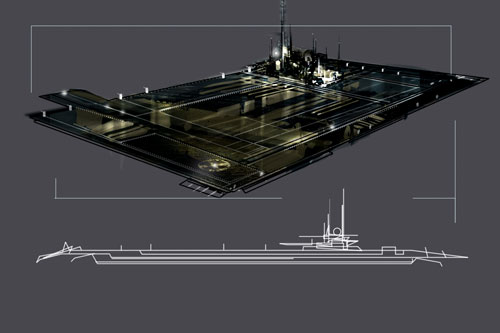Iceland, Russia, and the coming Arctic Ocean smackdown
Sunday, October 12th, 2008Iceland has gone bust. But all is not lost. Swimming toward them is. . .a bear! It’s Russia! Vladimir Putin no less, looking as sexy as ever in those bathing trunks of his. Russia is loaning Iceland about the equivalent of a third of Iceland’s GDP, and God only knows what the terms are going to be. I’m sure it’s not going to come cheap, though; although it seems unlikely Russia will get a base out of it (not yet anyway), they’re clearly going to have a lot more maneuvering room in the North Atlantic now. In fact, it seems that this could become the greatest Russian foreign policy coup since . . .since . . .shit, since Cuba? Anyone want to help me put this in perspective?
I should also point out that this has occurred despite the fact that the Russian stock market has shut down several times in the last month. What people often miss, though, is that that stuff doesn’t matter as much over there: their stock market handles a fraction of their economy, whereas it turned out OUR stock market handled many times our economy’s weight in bullshit assets. Score one for more primitive markets. Russia is now able to use its immense foreign currency reserves to stir up additional trouble for a weakening West, and Iceland is the first such move.
It won’t be the last, though. And Iceland is particularly interesting: in the Cold War, it was the key to the sea-lanes between the U.S. and Europe; had the shooting started, it would have been essential for the Red Navy to neutralize Iceland in order to cut the supply-lines to NATO forces in Western Europe seeking to resist a Warsaw Pact invasion. Now Iceland’s geopolitical angle may be a little different. As global warming keeps on opening up the Arctic Ocean, Russia is getting ever more interested in claiming ever vaster areas of energy-rich seabed. She planted a flag on the North Pole last year, much to Canada’s chagrin. (Harper’s comprehensive 07 article on this issue is well worth reading.) And now there’s even been talk that Canada should invite Iceland to join it, just like it did to Newfoundland back in the 1940s: after all, Reykjavik is no further from Ottowa than Vancouver. Someone may yet save Bjork from the bear.




 In the eyes of their designers, two factors made the Rafts a survivable proposition: first, most of their weapons could be utilized for defensive purposes against oncoming missiles (e.g., the craft possessed a myriad smaller lasers that could be trained directly upon such incoming targets) and, second, a Raft was so large that even a direct hit was unlikely to be fatal. When possible, Rafts were placed on or near the equator to maximize their space-launch potential.
In the eyes of their designers, two factors made the Rafts a survivable proposition: first, most of their weapons could be utilized for defensive purposes against oncoming missiles (e.g., the craft possessed a myriad smaller lasers that could be trained directly upon such incoming targets) and, second, a Raft was so large that even a direct hit was unlikely to be fatal. When possible, Rafts were placed on or near the equator to maximize their space-launch potential.